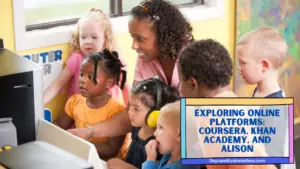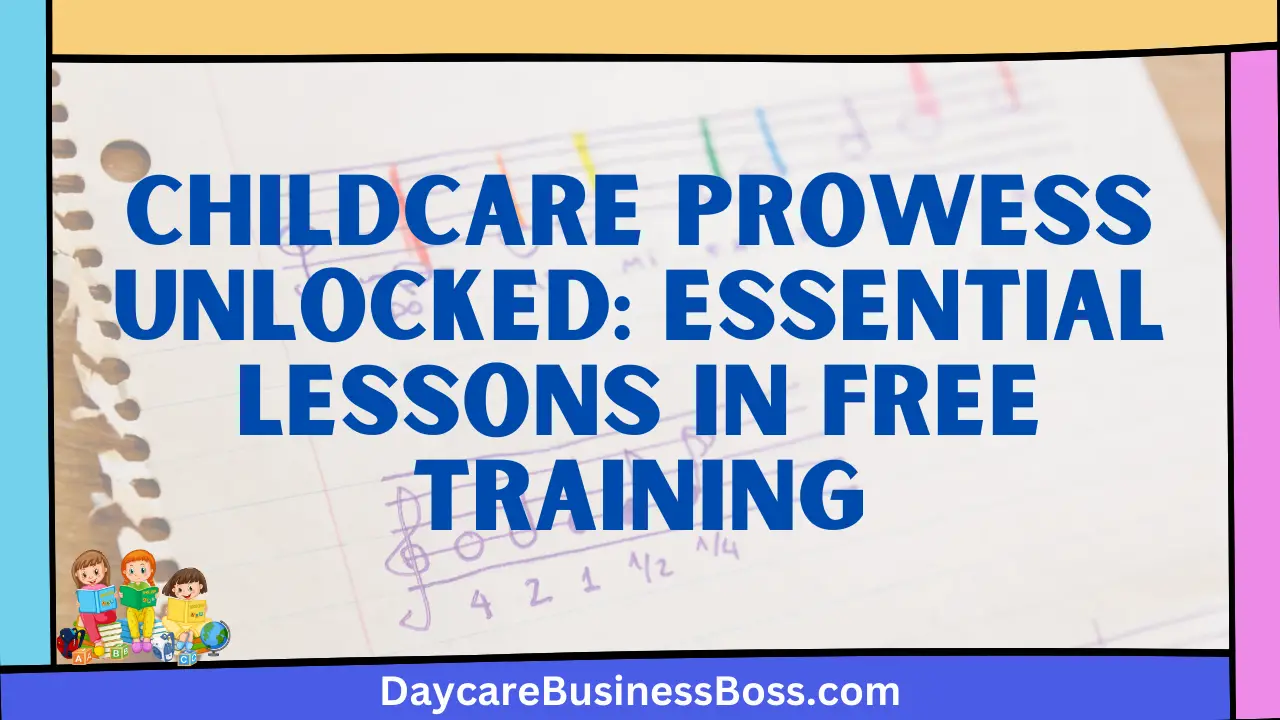The availability of free daycare training courses has transformed the landscape of professional development in childcare in our fast-paced age when knowledge is readily available at our fingertips. These courses provide access to a plethora of insights, strategies, and practices that help to foster caring environments in which children can grow physically, emotionally, and cognitively.
The most useful topics for free daycare training courses include child development, safety, and teaching techniques. These courses are available on platforms like Coursera, Khan Academy, and Alison.
In this article, we will look at the wide range of benefits provided by free daycare training classes. We will go into the main subjects they cover, throwing light on how they give crucial tools to childcare providers. We will unearth the platforms that serve as entry points to these priceless resources, making professional knowledge acquisition both convenient and accessible.
Child Development: Building a Strong Foundation

Child development is a cornerstone of good daycare operations, serving as the foundation for great care. To effectively nurture and support children, childcare workers must have a thorough awareness of the various stages of physical, cognitive, emotional, and social development that children go through. This knowledge is not only necessary for providing age-appropriate care but also for creating an environment that supports holistic growth.
Free training courses have developed as essential resources for both aspiring and experienced daycare providers in the field of daycare education. These courses cover a wide range of topics, to provide caregivers with the knowledge they need to understand and cater to the developmental journey of each child in their care. The delicate process of language acquisition is one essential topic covered in these courses, stressing the critical stages that mark a child’s linguistic growth. With this understanding, daycare providers can foster a language-learning environment by fostering interactions that promote vocabulary expansion and communication skills.
The courses emphasize the progression of motor skill development, acknowledging that children experience a spectacular trajectory of physical growth from infancy to early childhood. Providers obtain insight regarding projected motor skill acquisition milestones, allowing them to plan activities that promote fine and gross motor development. Such exercises not only benefit physical health but also boost children’s self-esteem and confidence as they achieve new physical accomplishments.
Another critical aspect highlighted in daycare training courses is cognitive development. The development of children’s cognitive talents, such as problem-solving, memory retention, and creative thinking, is thoroughly examined. Daycare providers can select a varied range of activities that challenge and interest young brains by understanding the stages of cognitive development. This customized approach not only promotes intellectual advancement but also builds a passion for learning, laying the groundwork for a lifelong pursuit of knowledge.
The emphasis on emotional and social growth is maybe equally crucial. Children’s emotional well-being and social interactions establish the framework for their future relationships and overall mental health, according to free daycare training classes. These classes dig into the numerous emotional stages that children go through, providing insights into how to support them in managing their feelings. Daycare workers also learn ways to promote positive social connections, allowing children to form friendships, communicate empathically, and resolve disagreements constructively.
Daycare providers have the skills to notice developmental delays and deviations from the norm by absorbing the knowledge taught in these courses. With this knowledge, they may execute timely interventions and collaborate with parents and specialists to provide the appropriate assistance. Individualization is also emphasized in the training, with carers encouraged to adjust activities to each child’s specific requirements and pace of development. This customized approach not only boosts children’s self-esteem but also creates a sense of inclusion and belonging.
Read more about: Building a Strong Financial Foundation: Daycare Startup Expenses Unveiled
Safety Measures: Creating Secure Environments
The primary concern in daycare settings is the safety of the children entrusted to the care of experts. When parents entrust their most valuable possession – their children – to childcare providers, the need to protect their well-being becomes an unambiguous commitment. Daycare facilities must not only provide a caring environment for growth and development, but they must also execute stringent safety standards that protect children from any threats and crises. The importance of safety in daycare settings is so great that it serves as the foundation of any competent childcare operation.
Recognizing the critical importance of safety, free training courses for daycare providers have arisen as critical resources to educate and empower caregivers to establish environments that prioritize the welfare of children. These courses provide comprehensive education on a variety of safety measures, providing information and skills ranging from accident prevention to critical emergency management.
The ability of childcare providers to respond to emergencies is central to these training programs. CPR (Cardiopulmonary Resuscitation) and first aid training are frequently included in courses, ensuring that clinicians are prepared to provide prompt assistance when a child’s health or life is in danger. This training goes beyond technical proficiency; it instills in caregivers a sense of confidence and readiness, allowing them to respond quickly and decisively in crisis circumstances.
The seminars emphasize the importance of childproofing environments to reduce dangers. Childcare professionals learn to recognize potential hazards and put preventative measures in place to avoid accidents. From securing sharp objects to installing safety gates and socket covers, these procedures work together to provide an environment in which children may explore and learn without putting themselves in danger.
Another crucial aspect emphasized in childcare safety training is maintaining a clean and sanitary workplace. To avoid the transmission of germs and illnesses, the courses emphasize the significance of frequent cleaning, disinfection, and basic hand hygiene. Daycare providers that follow these recommendations contribute to the general well-being of the children and create a healthy environment that promotes growth and development.
Nutrition, an important aspect of infant development, is also emphasized in these courses. Providers learn about important dietary requirements, ensuring that children’s meals and snacks are balanced, healthy, and safe. This knowledge not only benefits children’s physical health but also instills healthy eating habits in them that will benefit them for the rest of their life.
Daycare providers establish themselves as dependable and responsible stewards of children’s well-being by gaining a full awareness of these safety procedures through training courses. Parents entrust their children to these specialists, and the information learned from the courses helps providers to build situations in which children can thrive without putting themselves in danger. This gives parents peace of mind, knowing that their children are in the hands of people who are well-prepared to handle any circumstance that may happen.
Teaching Techniques: Nurturing Young Minds
The foundation of excellent teaching practices is at the heart of every exceptional daycare experience. Daycare providers must acquire the capacity to engage children in activities that not only foster creativity but also light the flames of curiosity and learning. As young minds avidly absorb information and attempt to make sense of their surroundings, caregivers have an important role in influencing the trajectory of their cognitive and emotional development. To that end, free childcare training courses have arisen as vital resources that equip caregivers with the knowledge and skills needed to establish dynamic and interesting educational environments.
The art of building age-appropriate curricula is one of the primary areas of concentration in these training sessions. Recognizing that children at various developmental stages have diverse needs, preferences, and capacities, daycare providers learn to modify their teaching strategies to accommodate these differences. Understanding physical, cognitive, emotional, and social development milestones allows providers to design lessons that both challenge and resonate with children, enabling optimal engagement and progress.
The training courses dive into the concept of play-based learning, which is a foundational component of effective early childhood education. Providers are discovering that play is more than simply a fun activity for children; it is also a strong engine for learning. Daycare providers can smoothly blend education and enjoyment by introducing play into lessons and developing a love of learning that extends beyond typical classroom bounds. Play-based learning allows children to explore, experiment, and discover answers on their own, developing problem-solving abilities and increasing self-confidence.
Another key issue emphasized in these training programs is effective classroom management. Daycare providers learn ways for fostering a positive and productive learning environment. These approaches ensure that every kid feels safe, respected, and valued, from setting clear expectations and routines to handling behavioral difficulties with empathy and consistency. A well-managed classroom allows for concentrated learning and meaningful relationships.
One of the most important benefits of free daycare training courses is the ability of caregivers to develop interesting lesson plans that engage young minds. These classes teach caregivers how to plan a variety of activities that encourage curiosity and critical thinking. Daycare providers learn to create experiences that motivate children to investigate and question the world around them, whether it’s through hands-on science experiments, immersive storytelling sessions, or interactive art projects.
The training highlights the significance of recognizing and accommodating different learning styles. Children absorb information in different ways, and providers are trained to alter their teaching approaches to accommodate these differences. Daycare providers may reach every kid in their care by embracing visual, auditory, kinesthetic, and other learning styles, ensuring that each one has the opportunity to develop and prosper.
Exploring Online Platforms: Coursera, Khan Academy, and Alison

Access to education has been transformed by the internet era, and daycare training is no exception. Coursera, Khan Academy, and Alison have all become centers for high-quality, free daycare training courses. These platforms provide a variety of courses that appeal to various levels of experience and schedules, allowing daycare providers to upskill without breaking their routines.
- Coursera: It is known for its numerous course offerings, and offers courses designed by prominent institutions and experts to daycare providers. From “Early Childhood Development” to “Child Nutrition and Cooking,” Coursera’s comprehensive courses cover a wide range of childcare topics.
- Khan Academy: It is known for its approachable learning style, and provides bite-sized lectures on topics such as child psychology, behavior management, and curriculum building. Its interactive features enable daycare providers to quickly learn topics and use them in their caregiving activities.
- Alison: It is a free learning platform, that offers courses on topics such as child safety, constructive discipline strategies, and nurturing creativity in children. Alison’s seminars empower daycare workers with practical knowledge that improves their skills and enriches their interactions with children.
Read more about: Smart Cleaning Solutions: Exploring the Realm of Free Daycare Cleaning Checklists
Frequently Asked Questions

What are the most common subjects addressed in free daycare training courses?
Free daycare training courses include a wide range of topics that childcare professionals must know to flourish in their employment. Child development, safety practices, and instructional strategies are all prevalent subjects. Child development issues cover stages of physical, cognitive, emotional, and social development, allowing caregivers to customize their approaches to the requirements of their children. CPR and first aid training, childproofing surroundings, sanitation rules, and emergency readiness are all part of good safety procedures. To enable effective learning experiences, teaching strategies focus on developing compelling curricula, encouraging creativity, and regulating classroom dynamics.
Where can I obtain no-cost daycare training courses?
Various online platforms provide free daycare training classes, making it easy for childcare providers to obtain useful information without incurring financial costs. Coursera, Khan Academy, and Alison are examples of notable platforms. Coursera works with prominent institutions to provide thorough courses on child development, nutrition, and other topics. Khan Academy offers interactive, bite-sized lessons on topics such as child psychology, behavior management, and curriculum design. Alison teaches classes about child safety, positive discipline, and nurturing creativity. These platforms enable daycare professionals to advance at their own pace and convenience.
What are the advantages of free daycare training courses for childcare providers?
Childcare providers can profit from free daycare training classes in a variety of ways. Caregivers can improve their understanding of child development by taking these courses, allowing them to provide more effective and tailored care to the children in their care. Knowledge of safety measures gives providers the ability to prevent accidents, respond to emergencies, and keep children safe. Learning effective teaching approaches enables providers to provide interesting and enriching learning experiences for children. Overall, these courses improve the quality of care provided by childcare providers while also contributing to the overall development of the children under their care.
To learn more on how to start your own daycare checkout my startup documents here.
The information provided by DaycareBusinessBoss.com (“The Site”) is for general informational purposes only. All information on the Site is provided in good faith, however, we make no representation or warranty of any kind, express or implied, regarding the accuracy, adequacy, validity, reliability, availability or completeness of any information on the Site. Under no circumstance shall we have any liability to you for any loss or damage of any kind incurred as a result of the use of the Site or Reliance on any information provided on the Site. Your use of the Site and your reliance on any information on the Site is solely at your own risk.
This blog post is for educational purposes only and does not constitute legal advice. Please consult a legal expert to address your specific needs. Terms and Conditions. (https://daycarebusinessboss.com/terms-conditions/)

Meet Shawn Chun: Entrepreneur and Childcare Business Fan.
I’m a happy individual who happens to be an entrepreneur. I have owned several types of businesses in my life from a coffee shop to an import and export business to an online review business plus a few more and now I create online daycare business resources for those interested in starting new ventures. It’s demanding work but I love it. I do it for those passionate about their business and their goals. That’s why when I meet a childcare business owner, I see myself. I know how hard the struggle is to retain clients, find good employees and keep the business growing all while trying to stay competitive.
That’s why I created Daycare Business Boss: I want to help childcare business owners like you build a thriving business that brings you endless joy and supports your ideal lifestyle.


